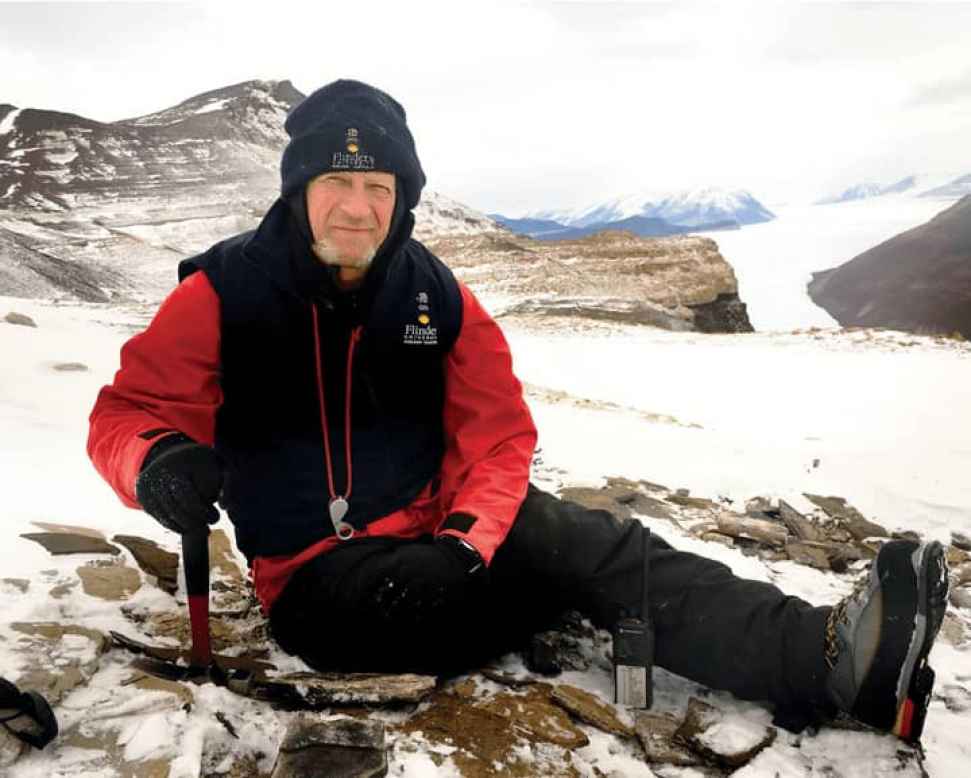John Pickrell
WHEN INTELLECT
WAS BORN
—
Reconstructing the brains of fossil fish that lived 400 million years ago is offering palaeontologists unprecedented insights into the early evolution of our own brains.
Anything really interesting in the emergence of the human blueprint happened hundreds of millions of years ago, before our ancestors first crawled onto land, says Flinders palaeontologist Professor John Long. That means if we only focus on our recent history to understand our evolution, we’re too late to the party.
“Most of the big evolutionary changes between the origin of vertebrates and humans really happened in the fishes before they left the water,” he says. “The origin of limbs, jaws, teeth, breathing, sexual copulatory reproduction – all of these things took place in fish, and the rest was just fine-tuning.”
This philosophy guides the work of Professor Long’s research group, which is trying to unravel how the human body plan was assembled, while also understanding the fundamental evolutionary changes that carried from fish to limbed vertebrates and ultimately to our own species.
To this end, he and Flinders Palaeontology Group colleague Dr Alice Clement have been studying fossils to reconstruct the brains of fish from more than 380 million years ago during the Devonian Period.
“I’m really interested in documenting the changes in the brain and braincase in fish over the water-to-land transition,” says Dr Clement. “I want to look at the first tetrapods – or land animals – and their closest fishy relatives to see exactly which changes and features appeared and have then been maintained through to the human brain.”

For the past 30 years I have been collecting from the Gogo sites in northern Western Australia, whose perfectly preserved 3-D fish fossils have yielded many significant discoveries, including mineralised soft tissues and the origins of complex sexual reproduction in vertebrates.
The technique allowed for a prehistoric brain to be rigorously reconstructed for the first time, using computer models and data from both living animals and fossils.
In 2016, Dr Clement and Professor Long published groundbreaking research on the beautifully preserved fossil skull of a lungfish called Rhinodipterus, from the 385-million-year-old Gogo Formation in Western Australia’s Kimberley region.
Along with colleagues from Uppsala University in Sweden, Dr Clement pioneered a ‘brain-warping’ technique, whereby she studied the brains of modern lungfish and used these insights, along with the fossil braincase of Rhinodipterus, to more accurately reconstruct its brain.
This innovation was significant, as fish brains don’t fit snugly into the braincase. The resultant gap means fossil braincases alone aren’t good guidelines for the shape of the brains that once sat inside them. The technique allowed for a prehistoric brain to be rigorously reconstructed for the first time, using computer models and data from both living animals and fossils.
In May 2018, the pair published a brain reconstruction of a second fish, called Ligulalepis, from 400-million-year-old rocks near Wee Jasper in New South Wales.
Exploring evolutionary changes in these brains could reveal when and why certain senses, such as smell or sight, took precedence and allowed some animals to succeed where others failed. “What’s really cool is that you can track changes through evolutionary time,” says Dr Clement. “You can see if there are certain regions of the brain that are increasing or decreasing in relative size.”
In the lungfish, she noticed a gradual increase in part of the forebrain called the telencephalon, likely related to the sense of smell. “This suggests to me that vision is less important in these fish, perhaps because of the murky water they live in, and that’s why they’re relying on sense of smell instead.”
While the earliest well-established fossils of land-faring limbed fish were found in Greenland and dated to 380 million years ago, Dr Clement says there are other intriguing fossil footprints in Poland that are perhaps 20 million years older. “There are plenty of trackways that are a bit ambiguous, but these ones in Poland have distinct digit impressions, so you can tell there was a foot or a hand.”
The changes required to walk on land were enormous. “They had to undergo huge structural changes to their vertebral column, ribs, shoulders, and pelvic girdles to suddenly carry this weight and deal with gravity,” she says.
Dr Clement expects to also find changes in the brains. Fossil skulls from across the transition show the eyes moving to the top of the head, which is sensible at the water’s surface. The eye socket size also increases, suggesting greater reliance on vision, which may prove to be mirrored within the brains in an enlargement of the optic lobe.
“There are just so many questions that arise from this kind of brain reconstruction data. It’s a rich source of information,” says Professor Long. “We can look at the kinds of changes going across major evolutionary boundaries in early fish.”
He suspects that they might find changes in the inner ear canals, important for balance. Another brain region they will interrogate is one that is important for sensing light and daylength, and which probably became more important to animals moving onto the land.
Luckily, with several rich Devonian fossil sites in Australia, and Professor Long mounting expeditions to Antarctica to collect similar fossils there, they have plenty to work with.
“I’ve got beautiful fossils at my disposal,” says Dr Clement. “You can’t do these sorts of analyses on just any fossil, but we do have quite a few really beautiful three-dimensionally preserved fossils that span the time period, which will really help enlighten how things changed over time.”
![]()
Sturt Rd, Bedford Park
South Australia 5042
South Australia | Northern Territory
Global | Online
CRICOS Provider: 00114A TEQSA Provider ID: PRV12097 TEQSA category: Australian University











